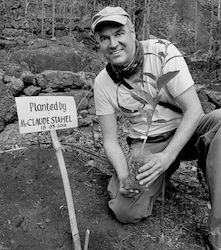The search for the best green coffees in the world led Claude Stahel to the hills of the Eastern Ghats in Araku.
Under British colonial rule, Adivasi farmers had to sell their home-grown coffee for a handful of rupees to government collection stations, where the poorest quality raw product found its way onto the world market. The stations disappeared and with them the few rupees.
Ten years ago, the Naandi began Foundation began to teach individual families the craft of biodynamic coffee cultivation. The success came very soon and convinced with the world of specialty coffee. The positive results were higher revenues and new perspectives for the farmers and a culinary event for coffee lovers.

